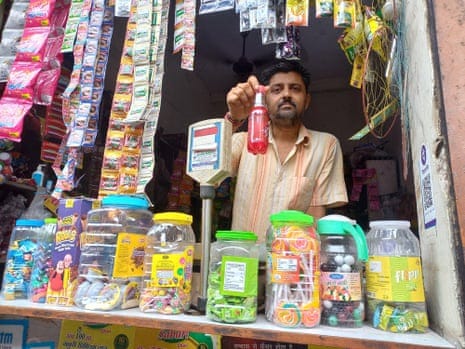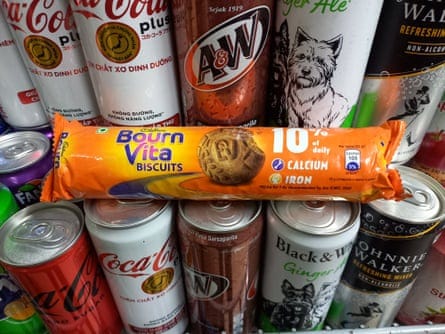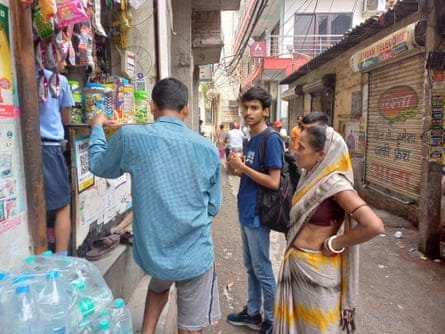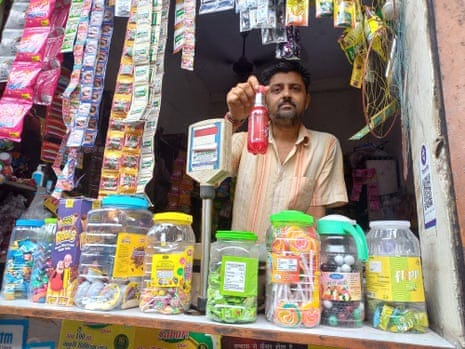the health strategy
digital review
for in-person health, digital health
and hybrid health strategy
Joaquim Cardoso MSc.
Senior Research and Strategy Officer (CRSO),
Chief Editor and Senior Advisor
January 19, 2023
Key Takeaways:
Food companies in developing countries are marketing ultra-processed foods as being ‘good for you’, targeting children with claims of health, height, strength, energy, and happiness.
Ultra-processed foods contain high levels of salt, sugar, fat, and additives, which are associated with obesity, cancer, type 2 diabetes, and cardiovascular disease.
- These foods have lower levels of essential nutrients like protein, zinc, magnesium, and vitamins, necessary for optimal growth and development in children.
- Misleading marketing tactics by food corporations have contributed to a crisis in non-communicable diseases (NCDs), such as rising diabetes and hypertension, even in rural areas.
The World Health Organization (WHO) issued guidelines recommending restrictions on marketing high-fat, high-sugar, and high-salt foods to children due to their harmful impact on health and nutrition.
- Ultra-processed foods often involve additives and unhealthy ingredients, including fruit juice concentrates, maltodextrin, hydrogenated oils, and soya protein isolate.
- Marketing tactics include the use of celebrities and false health claims to promote these foods as a modern alternative to traditional diets.
Baby foods, including “growing-up” formulas, have been extensively marketed in low- and middle-income countries, leading to increased sugar consumption among infants and young children.
- Aggressive marketing and increased snacking habits have been driven by multinational food companies, leading to a rise in NCDs and childhood obesity in developing countries.
The focus on profits rather than social responsibility by food corporations has limited consumers’ ability to make healthy food choices.
Public health experts emphasize the need to raise awareness about NCDs and hold food corporations accountable for their role in the global health crisis.
DEEP DIVE

How food companies ‘sweetened the world’ — and increased the risk of disease
The hard sell of ultra-processed foods in developing countries as being ‘good for you’ gives children a taste for sugar and salt that could have lasting effects on their health
The Guardian
Kaamil Ahmed
Fri 14 Jul 2023
The bright red bottle of Sting, an energy drink, catches Sunita Devi’s eye when she finds her local shopkeeper has run out of the biscuits she hoped to buy to fuel her son through his homework. She cannot read the English label, but 10-year-old Ajit says it sounds healthy.
“Stimulates mind, energises body” the bottle proclaims. It’s the type of marketing that helps shop owner Vasu Gupta sell energy drinks — mostly to families who have migrated from the countryside to a slum in Govindpuri in the Indian capital, Delhi.
But the drink, which is made by PepsiCo India, is not quite as beneficial as it sounds. A 250ml bottle contains 17g of sugar — a third of the daily intake recommended by the World Health Organization, although there is nothing on the packaging to warn about its high sugar levels; and the small print on the back says the drink is not recommended for children.

‘Stimulates mind, energises body’: Sting energy drink is marketed with healthy claims. Photograph: Amrit Dhillon
Drinks and snacks claiming to be good for consumers are concerning food campaigners working in India and elsewhere in the developing world, who say that food companies are getting away with marketing ultra-processed foods, high in sugar and salt, by promising health, height, strength, energy and even happiness.
The result, they say, is a crisis in non-communicable diseases (NCDs) in the form of rising diabetes and hypertension and poorly nourished children, which reaches even into the countryside — once considered to be unaffected by “western” diseases linked to sedentary urban life.
The link between unhealthy diets and ultra-processed food and drinks prompted the WHO to issue guidelines this month recommending that governments restrict marketing of foods high in fat, sugar and salt to children, because of the harmful impact on their health and nutrition.
Arun Gupta, head of the thinktank, Nutrition Advocacy in Public Interest — India, says there is a “ticking timebomb” in the country, as NCDs increase and food corporations continue to misleadingly market processed foods.
“They sell happiness, they sell it as ‘this is the modern world’ … everybody wants their child to grow well, tall and free from disease. Those aspirations are actually used, emotionally exploited,” he says.
Ultra-processed food involves extremely high levels of manufacturing to produce. It includes all formula milk, many commercially produced baby and toddler foods, fizzy drinks and sweets, fast food, snacks, biscuits and cakes, as well as mass-produced bread and breakfast cereals, ready meals and desserts.
What do these foods contain?
Ultra-processed ingredients include fruit juice concentrates, maltodextrin, dextrose, golden syrup, hydrogenated oils, soya protein isolate, gluten, “mechanically separated meat”, organic dried egg whites, as well as rice and potato starch and corn fibre. Additives such as monosodium glutamate, colourings, thickeners and glazing agents are also ultra-processed.
Why does it matter?
Ultra-processed food contains higher levels of salt, sugar, fat and additives that are associated with obesity, cancer, type 2 diabetes and cardiovascular disease. They also tend to have lower levels of protein, zinc, magnesium, vitamins A, C, D, E, B12 and niacin necessary for a child’s optimal growth and development. It is also thought that other mechanisms are at play in UPFs being associated with worse health outcomes, including negative effects on the development of gut microbiota.
Gupta says he routinely finds foods marketed towards children that make significant health claims, but when analysed are high in sugar and highly processed, such as a whey protein product called Supermilk targeted at children as young as four.
The brand behind it, Gritzo, markets its product with adverts that suggest it can aid a child’s development into an athlete, as well as a video with an actor portraying a “smart mom” claiming that traditional food “is not necessarily good enough for today’s generation”, and promoting Supermilk.
However, when Gupta studied the ingredients, he discovered there were 50.8g of sugar per 100g — more than half the contents before milk is added. The product also recommends adding more sugar to taste. He points out that even the protein content could be harmful. “It’s possible that a kid’s regular, home-cooked food provides adequate protein for them,” he says. Additional protein could cause dehydration by putting a strain on kidneys, and children with poor digestion could also have difficulty processing high levels of protein.

Food corporations have encouraged snacking in markets where it was previously rare, often marketing high-fat and sugary foods at children. Photograph: Amrit Dhillon
Ashish Verma, another Govindpuri store owner, says PediaSure, a protein shake which claims to help growth, immune functions and brain development, is also popular with parents.
“Parents want energy bars and beverages that will keep their children strong and healthy. Some years ago, Horlicks advertised that it could help children pass exams and we finished our stocks in two days,” says Verma.
The maker of PediaSure, Abbott, is fighting a class action lawsuit in the US disputing its assertion about boosting height, yet for some consumers the chance that these products can live up to their “clinically proven” claims keeps them buying them.
Gupta says celebrities are often used to promote ultra-processed foods as an alternative to traditional food. In December, he wrote a letter complaining to Bollywood actor Amitabh Bachchan after he promoted a biscuit brand as equal to homemade bread for busy parents.
During Covid, in every country I worked in they were giving away junk food and sugary beverages to the poor
Barry Popkin, nutritionist
Gupta has focused on tackling misleading marketing for children’s foods, and has fought against companies marketing baby formula as an alternative to breastmilk. In 1991, he established the Breastfeeding Promotion Network of India, but says it is hard to keep up with the pace of marketing campaigns.
“The market has become very aggressive in terms of promotion. The industry has used every tactic,” he says, adding that while India has a law limiting the marketing of baby foods to children under two, companies persist in promoting them.
“They continue to put their money into marketing, for example getting to the health workers — there have been reports of paying cash, there have been reports of helping with services. We are unable to control that because the government is not very serious.”
The NCD alliance, a global network driving action on non-communicable disease prevention and care, accused corporations of benefiting from Covid by using it to increase awareness of their brands, such as through donations of their products during lockdowns.
Research published in the WHO’s journal in May showed that baby foods are a particular concern. While there are global regulations in place to stop the marketing of breastmilk alternatives to children under six months, it found “growing-up” formulas were commonly marketed at children above that age.
According to the research, more than 90% of sales of growing-up formula took place in low- and middle-income countries in 2022. This trend has helped fuel the amount of sugar bought through baby and infant foods, which doubled in developing countries from just over 400bn grams in 2010 to about 800bn grams in 2021.
Nutritionist Barry Popkin, who co-authored the research, says food corporations have “sweetened the world” by encouraging snacking in markets where it was previously rare and through high-sugar and salty foods marketed at very young children.
He says these foods can end up being a leading source of calories but are nutritionally lacking while also giving children a taste for addictive sweet and salty foods, increasing their susceptibility to non-communicable diseases. The WHO’s new guidance on marketing unhealthy foods says poor diets were responsible for about 8 million deaths linked to NCDs in 2019.

Sunita devi stands outside the local shop with her son, Ajit, (left, in the doorway) and other customers. Photograph: Amrit Dhillon
“When you get undernutrition as an infant it stunts you for life, it affects your body composition and it increases the amount of fat around the heart and liver, which we call visceral fat, and that’s the most dangerous fat,” says Popkin, because of the fat’s link to problems such as insulin resistance, which is the cause of type 2 diabetes.
“So when you see countries like India, Nepal and African countries, where you see an increasing amount of these products fed to infants, let alone two- to four-year-olds, you’re just feeding their obesity and enhancing their desire for sweetness — and it carries over to later life.”
According to Popkin, widespread snacking is a relatively new trend that was pushed through the marketing of multinational food companies during the 20th century in high-income countries, to the point where it has become normal.
Those markets, he says, have become saturated and so the companies began looking at the rest of the world.
“Industry was marketing it, pushing it, making it available, making the prices attractive, giving it away in schools, at sporting events. That’s how they grew the sugary beverage market and that’s how they grew other snacking markets,” he says. “During Covid, in every country I’ve worked in, they were giving away junk food and sugary beverages to the poor, saying ‘this will help you’.”
Public health researcher Edwin Kwong was part of a team that looked at how large corporations target developing countries by buying local competitors and investments such as production plants. This also gives them sway over governments when fighting against food regulations by touting the economic benefits and employment they bring.

Gritzo markets its Supermilk with adverts that suggest it can aid a child’s development into an athlete. Photograph: Kaamil Ahmed
However, Kwong says any claims they make about economic or social benefits of their companies are simply to drive more market share.
“The only corporate social responsibility of corporations is profits, it’s to shareholders. So for them, it is a market to grow profits, that’s why they target them. It’s as simple as that,” says Kwong.
He says companies should be held responsible for rising NCDs in developing countries and that NCDs are not self-inflicted “lifestyle diseases”, because aggressive marketing by “big food” has stripped consumers of their ability to make healthy food choices.
He adds that while most people in developing countries understand the dangers of infectious diseases, they have not yet grasped the threat posed by NCDs.
“I don’t think people would classify [NCDs] as an epidemic, even though it absolutely is; it kills a lot of people. It’s about trying to alert people around the world to this issue, and holding those responsible accountable. This includes these large transnational organisations whose profits continue to grow — the people responsible for maiming, injuring, killing a lot of people are not held to account,” says Kwong.
Originally published at https://www.theguardian.com on July 14, 2023.




